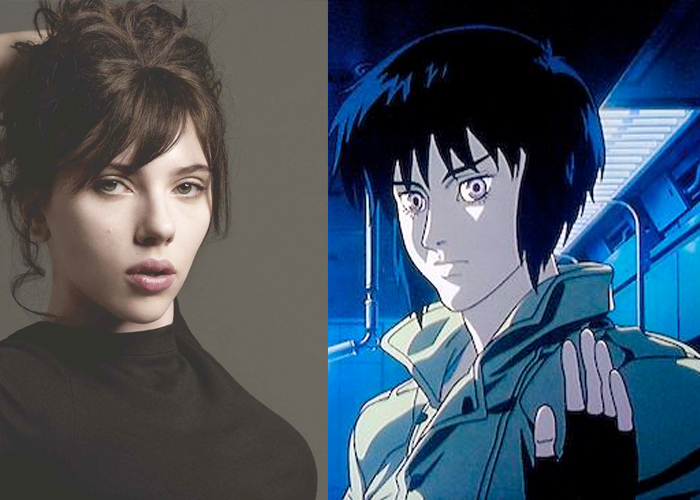If you didn’t already know, the internet recently caught fire due to confirmations about Scarlett Johansson landing the leading role in a new Hollywood rendition of Ghost in the Shell. There are many valid reasons to get upset about this, but the most prominent one appears to be based around the fact that the lead character in GITS is a woman named Motoko Kusanagi. Now, I don’t know if you’ve seen Scarlett Johansson recently, but she hasn’t gotten any more Japanese. Hollywood is no stranger to white-wash casting and there’s been plenty of controversy to go around on that basis of late (read: Ridley Scott), but with this particular case, there is a necessary counterpoint to be made, and it lives inside this trailer:
That’s Infernal Affairs, a Hong Kong crime thriller that rose to cult-classic status around a decade ago. Not long thereafter, Martin Scorsese decided to do an English language remake called The Departed, set in Boston, full of Irish-Americans mobsters, rather than Asian Triad. Did anyone decry this? No, and why would they? Scorsese was merely transposing the story to a setting that he understood, telling his own version of an existing story. Is that what Bill Wheeler and Rupert Sanders are doing with Ghost in the Shell? If they truly intend to take the bones of the narrative, move it to an American stage and tell their own story, good for them, it takes a lot of composure to approach a classic with such intent. That’s why it almost never happens. Unfortunately, it would appear that these two were merely drafted in a wider plan to take an iconic anime and squeeze box office receipts out of it until it looks like Christian Bale in The Machinist.
That’s the dilemma, then. Whilst it’s perfectly reasonable for the adapters to make changes, thus leaving their own stamp on the story, such a decision is tainted when you realise that there was no artistic bearing to it. This, in a nutshell, is why anime is largely unsuitable for live action treatment, let alone Hollywood treatment. You simply will not be able to replicate the artistic merit of the original and in attempting to do so, what you’re left with is ultimately little more than a waste of time, something which freezes out potential new fans and offends old ones. If you deviate, then the soulless, money-grubbing nature of the project only becomes more evident. Adapting a book is one thing, you’re providing it with a visual counterpart and if you’re remaking a live-action film (and doing it well), you will be presenting the narrative in a new light. With animation, but particularly with anime, all the ambition and all the scope is right there to be seen, so in trying to recreate it in live-action, the filmmakers are severely limiting themselves and in the case of something like Ghost in the Shell, the amount of money they would need to pull it off hampers the creativity even further.
Hollywood is a cynical machine, it doesn’t assume that A-list stars sell seats, it knows that they do. It also knows that once such an A-lister becomes involved, the scale of the film has to run to catch up. Look at it this way, the original Ghost in the Shell film cost $5 million to make, Johansson is being paid twice that just to appear in the new one. The moment you stamp a name like that on your project, you’ve made an investment, the bad publicity they’d receive if she walked would torpedo the whole thing. The other issue with transitioning anime into blockbuster material is the ratio of spectacle to story, Hollywood like to go big on spectacle and light on story, we have Joseph Campbell to thank for that, only the most trustworthy directors are ever offered the chance to create something deeper in this day and age. Anime on the other hand often prides itself on narrative depth. Ghost in the Shell (as well as the sequel and TV series) is full of complex, thought provoking ideas about the nature of humanity, how politics will translate into the rising digital age and the missing link between AI and true organic intelligence.
The best way that Hollywood can honor material like Ghost in the Shell is through legacy and that happens whether they want it to or not. Without Ghost in the Shell, we wouldn’t have The Matrix, Deus Ex or even Avatar. Modern cinematic sci-fi owes an enormous debt to Mamoru Oshii, to say nothing of Akira, Cowboy Bebop, Neon Genesis Evangelion and others. Whilst an ill-fated attempt at a live-action version won’t do that legacy many favors, it won’t damage it. Scarlett can have her fun jumping off rooftops in some narrow-minded romp that eschews all the existentialism and flair that elevated the original, some might enjoy it, others will bluster, but at the end of the day nothing is unbalanced. The net is vast and infinite.
If you want to see a legitimate attempt to honor Ghost in the Shell in live action, check out this amazing photography project from last year.
Some of the coverage you find on Cultured Vultures contains affiliate links, which provide us with small commissions based on purchases made from visiting our site.



